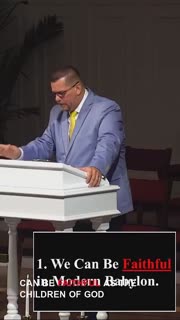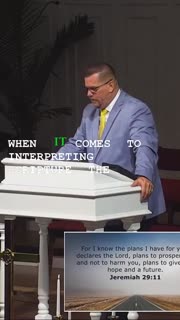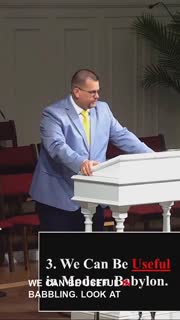Faithful Living in a Modern Babylon
Devotional
Sermon Summary
Bible Study Guide
Sermon Clips
### Quotes for Outreach
1. "When you wake up in a country that leads the world in producing pornography and exporting it around the world, you are living in modern Babylon. When you wake up in a country plagued with materialism, you are in modern Babylon. When you wake up in a country that no longer regards the sanctity of human life and offers its children uproar, on altars of greed and hedonism, you are living in modern Babylon." [22:18] (31 seconds)
2. "We can be faithful as the children of God in modern Babylon. Church, we may have woken up this morning in modern Babylon. We may have woken up in a place that we don't even recognize anymore. But God has not abandoned us. God has not forsaken us. We may wake up in a culture that is hostile to God. But God's arm has not been shortened and God's plans have not been thwarted. God's kingdom is still advancing. So even in modern Babylon, we can be faithful to God." [26:08] (44 seconds)
3. "We can be hopeful in modern Babylon. Look at verse 11. For I know the plans I have for you, declares the Lord. Plans to prosper you and not harm you. Plans to give you what? Hope and a future. Many of those Jews would die in exile in Babylon. But the prophecy of Jeremiah, the prophecy of God, would echo in their hearts until their dying breath. Folks, listen. As believers, as followers of Jesus Christ, we are to be hopeful, not doubtful. We are to be people that see the glass half full, not half empty." [45:05] (57 seconds)
4. "Our hope does not rest on a donkey, and it certainly doesn't rest on an elephant. Our hope lies in an empty tomb. A risen savior, a powerful gospel, and a kingdom that cannot and will not ever be shaken. You need to listen to me this morning. This is our declaration of faith. Jesus Christ is Lord. Jesus Christ is Lord. Jesus Christ is Lord. Did you hear me? Jesus Christ is Lord. How about saying it with me one time? Jesus Christ is Lord. Amen? That's our declaration of faith. Nothing else matters. That is all that matters." [46:12] (48 seconds)
5. "Do you realize God is for us? That He's not against us? The Bible tells us that. The Bible says there's no greater love than this that a man laid down his life for his friends. That's what Jesus did at Calvary. He laid down his life for the church. You realize that all of heaven this morning, according to Hebrews chapter 11, or chapter 12, is up there cheering us on? It's like a huge coliseum. And everybody up there saying, Hey, we've been where you are. We walked the path. We made it to the end. You can do it too." [53:13] (40 seconds)
### Quotes for Members
1. "When it comes to interpreting scripture, the Bible, you need to understand that the text is always determined by the context. You have to start with the text, and in order to interpret that text, you've got to understand the context in which that text is given. When you do those, and you bring those two together, you've got a really good, solid, hermeneutical understanding of scripture." [10:31] (27 seconds)
2. "The problem isn't so much Babylon. The problem is us when we become like Babylonians. I figured he'd get quiet. We live in a culture today within the church where it's very hard for somebody to look at somebody inside the church and outside the church and be able to tell them apart. It was never supposed to be like that. We are foreigners. We are aliens. We are sojourners. The United States of America is not my home." [28:32] (41 seconds)
3. "We can be useful in babbling. Look at verse seven. Pursue the well-being of the city. I have deported you to. Pray to the Lord on its behalf. For when it thrives, you will thrive. Well, let me just let you in on something. I don't know if you live in Wilmington. I don't know if you live in Leland. I don't know if you live in Castle Hayne or, what is it, Rocky? Thank you. Thank you. I'm still learning geography around here. It doesn't matter where you are living at. God himself has put you there." [41:15] (45 seconds)
4. "We can be fruitful in modern Babylon. Look at verse 6, the last part of it. He says, multiply there, do not decrease. Multiply there, do not decrease. I have literally heard Christians saying this this past week. Listen to what I'm fixing to say because you've heard it too. We are not about to have children and bring them into this environment. Who gave you that authority? Who told you you could make that decision?" [34:30] (43 seconds)
5. "We can be faithful in the face of persecution and difficulties. Why? Because this is only temporary. We are just passing through. This is not our home. I want to say this as lovingly and as affectionately as I can because I'm trying to encourage you this morning. But in encouraging you, I need to wake you up. Church, you need to stop worrying. You need to stop whining. You need to stop wringing your hands and realize that our God is still in control. He's still in charge, folks. What are you worried about?" [33:01] (49 seconds)
Ask a question about this sermon
1. "When you wake up in a country that leads the world in producing pornography and exporting it around the world, you are living in modern Babylon. When you wake up in a country plagued with materialism, you are in modern Babylon. When you wake up in a country that no longer regards the sanctity of human life and offers its children uproar, on altars of greed and hedonism, you are living in modern Babylon." [22:18] (31 seconds)
2. "We can be faithful as the children of God in modern Babylon. Church, we may have woken up this morning in modern Babylon. We may have woken up in a place that we don't even recognize anymore. But God has not abandoned us. God has not forsaken us. We may wake up in a culture that is hostile to God. But God's arm has not been shortened and God's plans have not been thwarted. God's kingdom is still advancing. So even in modern Babylon, we can be faithful to God." [26:08] (44 seconds)
3. "We can be hopeful in modern Babylon. Look at verse 11. For I know the plans I have for you, declares the Lord. Plans to prosper you and not harm you. Plans to give you what? Hope and a future. Many of those Jews would die in exile in Babylon. But the prophecy of Jeremiah, the prophecy of God, would echo in their hearts until their dying breath. Folks, listen. As believers, as followers of Jesus Christ, we are to be hopeful, not doubtful. We are to be people that see the glass half full, not half empty." [45:05] (57 seconds)
4. "Our hope does not rest on a donkey, and it certainly doesn't rest on an elephant. Our hope lies in an empty tomb. A risen savior, a powerful gospel, and a kingdom that cannot and will not ever be shaken. You need to listen to me this morning. This is our declaration of faith. Jesus Christ is Lord. Jesus Christ is Lord. Jesus Christ is Lord. Did you hear me? Jesus Christ is Lord. How about saying it with me one time? Jesus Christ is Lord. Amen? That's our declaration of faith. Nothing else matters. That is all that matters." [46:12] (48 seconds)
5. "Do you realize God is for us? That He's not against us? The Bible tells us that. The Bible says there's no greater love than this that a man laid down his life for his friends. That's what Jesus did at Calvary. He laid down his life for the church. You realize that all of heaven this morning, according to Hebrews chapter 11, or chapter 12, is up there cheering us on? It's like a huge coliseum. And everybody up there saying, Hey, we've been where you are. We walked the path. We made it to the end. You can do it too." [53:13] (40 seconds)
### Quotes for Members
1. "When it comes to interpreting scripture, the Bible, you need to understand that the text is always determined by the context. You have to start with the text, and in order to interpret that text, you've got to understand the context in which that text is given. When you do those, and you bring those two together, you've got a really good, solid, hermeneutical understanding of scripture." [10:31] (27 seconds)
2. "The problem isn't so much Babylon. The problem is us when we become like Babylonians. I figured he'd get quiet. We live in a culture today within the church where it's very hard for somebody to look at somebody inside the church and outside the church and be able to tell them apart. It was never supposed to be like that. We are foreigners. We are aliens. We are sojourners. The United States of America is not my home." [28:32] (41 seconds)
3. "We can be useful in babbling. Look at verse seven. Pursue the well-being of the city. I have deported you to. Pray to the Lord on its behalf. For when it thrives, you will thrive. Well, let me just let you in on something. I don't know if you live in Wilmington. I don't know if you live in Leland. I don't know if you live in Castle Hayne or, what is it, Rocky? Thank you. Thank you. I'm still learning geography around here. It doesn't matter where you are living at. God himself has put you there." [41:15] (45 seconds)
4. "We can be fruitful in modern Babylon. Look at verse 6, the last part of it. He says, multiply there, do not decrease. Multiply there, do not decrease. I have literally heard Christians saying this this past week. Listen to what I'm fixing to say because you've heard it too. We are not about to have children and bring them into this environment. Who gave you that authority? Who told you you could make that decision?" [34:30] (43 seconds)
5. "We can be faithful in the face of persecution and difficulties. Why? Because this is only temporary. We are just passing through. This is not our home. I want to say this as lovingly and as affectionately as I can because I'm trying to encourage you this morning. But in encouraging you, I need to wake you up. Church, you need to stop worrying. You need to stop whining. You need to stop wringing your hands and realize that our God is still in control. He's still in charge, folks. What are you worried about?" [33:01] (49 seconds)










